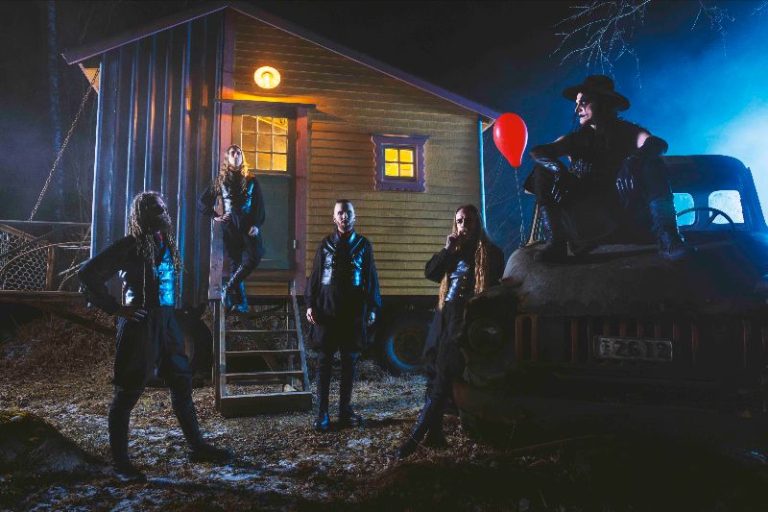Review By Ian Walker
In a genre often defined by its emotional weight and raw intensity, it takes a rare spark to stand out. With their debut full-length album Stranger To Love, German quintet SENNA has ignited something altogether unique — a sonic wildfire built on restless creativity, fearless experimentation, and heartfelt vulnerability. Out May 23rd via SharpTone Records, this record is not just a continuation of their vision from 2022’s A Moment of Quiet, but a declaration: SENNA is not here to follow; they’re here to lead.
Born from studio experimentation rather than traditional band ambitions, SENNA was never meant to become a “band” in the conventional sense. That lack of pressure turned out to be their greatest advantage. Guitarist Marcel Dürr puts it best: “We weren’t pursuing SENNA as a proper band at first… our goal was simply to write the music we enjoyed.” That ethos flows through Stranger To Love — an album shaped not by trends but by freedom.
The lineup is as solid as their songwriting: Simon Masdjedi delivers vocals that oscillate between brutal honesty and melodic grace, Tobias Stulz brings a second vocal and guitar layer, Dürr provides intricate textures and rhythms, while bassist Fabian Cattarius and drummer Leon Dorn hold it all together with tight, versatile grooves. Their chemistry is palpable throughout the record.
The album kicks off with “Hurricane,” a bold opener that sets the tone with soaring dynamics and introspective lyrics. It’s less about destruction and more about the internal storms that shape us — a metaphor that reappears across the album. The chorus explodes with urgency, but beneath the noise is a plea for clarity: “I want to feel it all, even if it hurts.”
“Rain” follows with deliberate pacing, showcasing SENNA’s ability to shift gears without losing momentum. Here, Simon’s vocals tug at emotional bruises while Stulz’s backing harmonies add another layer of depth. This is post-hardcore that leans into sensitivity without losing its backbone — like Touché Amoré meeting Deftones in a dreamlike downpour.
The explosive “Blackout” is one of the album’s most anthemic tracks, full of percussive punch and angular guitar work. It’s also one of the record’s most accessible songs, begging for live-stage singalongs with its huge hook and post-breakdown build-up that balances chaos with control. Meanwhile, “High Note” is less celebratory than its title suggests. Instead, it’s a moment of reflection where sonic restraint meets emotional climax — a kind of slow burn that reveals its richness in layers.
“Bodyguard” and “Drunk Dial Anthem” represent some of the album’s most genre-defiant moments. The former flirts with alt-rock accessibility without compromising SENNA’s edge, and the latter — as the title suggests — injects a dash of self-awareness and late-night regret that feels both confessional and cathartic. You could call it a ballad, but that wouldn’t do justice to its experimental structure or haunting emotional core.
Midway through the album, “Potential” stands as a thematic and musical fulcrum. A meditation on unfulfilled dreams and personal reinvention, it’s a high-water mark that blends dreamy delay-driven guitars with thunderous crescendos. This song may not scream for attention, but it lingers — the kind of track that deepens with every listen.
“Breeze” arrives like a palette cleanser, stripped-back and soothing in its first half before building toward a triumphant finale. It’s SENNA at their most restrained, but also most hopeful. In contrast, “Cliffhanger” pulls no punches — its title apt for a track that leaves you suspended between fury and fragility. The rhythm section here deserves special mention; Dorn’s drumming and Cattarius’s basslines provide a rhythmic heartbeat that drives the entire album.
As the album nears its close, “NS:LC” injects a jolt of unpredictable energy, combining shifting time signatures with an almost math-rock sensibility. It’s a reminder of SENNA’s refusal to color inside the genre lines. And then comes the finale: “Polarised” featuring Our Mirage. This collaboration isn’t just a guest feature — it’s a marriage of emotional intensity. Together, the bands blend anguish and affirmation, creating an outro that is both explosive and elegiac.
Lyrically, Stranger To Love reads like a journal cracked wide open. Themes of emotional distance, self-doubt, lost connections, and hopeful defiance pulse through each track. Yet there’s a subtle optimism here too — not the kind that arrives wrapped in resolution, but one born from resilience. SENNA doesn’t offer answers, but they do offer honesty, and in doing so, they carve a rare kind of connection with the listener.
Production-wise, the album is crisp without being sterile. There’s an organic warmth to the guitar tones, and the vocal mix smartly favors expressiveness over perfection. The dynamic shifts between clean and distorted sections are seamless, and the decision to avoid overproduction allows the raw emotion to shine.
There’s no filler here — each of the 11 tracks plays a role in the broader narrative. It’s a record that manages to be technically accomplished and emotionally resonant, never sacrificing one for the other. Fans of Holding Absence, Sleep Token, and Dayseeker will feel at home here, but SENNA isn’t just echoing peers — they’re speaking in their own voice.
Stranger To Love is an album that rewards attention. It’s not just another post-hardcore debut — it’s a carefully crafted work of introspective art that showcases the emotional and sonic range of a band on the cusp of something big. SENNA may have started as a side project, but this album proves they belong center stage. There’s no stranger to love in these songs — only honest encounters with it in all its beauty, pain, and confusion.

















+ There are no comments
Add yours